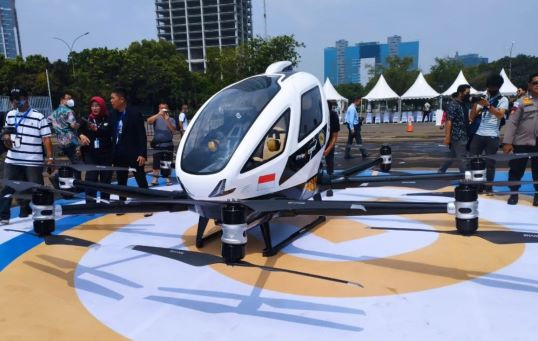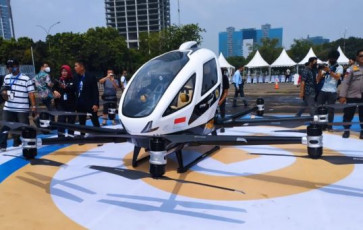Popular Reads
Top Results
Can't find what you're looking for?
View all search resultsPopular Reads
Top Results
Can't find what you're looking for?
View all search resultsFlying taxis, air mobility and challenges for Indonesia
In terms of an FDI cap, a more liberal approach should be taken to accelerate the development of the advanced air mobility industry in Indonesia.
Change text size
Gift Premium Articles
to Anyone
F
rom the inception of the aviation industry, the transportation of passengers and cargo by air has played a central role. Very few air passengers’ journeys begin and end at the airport. Rather, they start their journey at home, from a hotel or their office and want to end it somewhere similar, be it for business or pleasure.
However, it can sometimes take longer to get to and from the airport than the actual duration of the flight. Further, many airports are underserved by public transportation and have disproportionate pricing options.
Examples of this include high surcharges on tickets to the airport and expensive parking options. This adds a level of complexity to transportation.
This point is often overlooked by policymakers, who often focus on movement between transport hubs, be it airport to airport, port to port or station to station. Instead, the focus should be on mobility.
Such terminology means the ability to move by utilizing an integrated network of transportation modes. This involves traditional modes such as buses, bikes and cars, but also newer entrants like app-based ride-hailing services. This links also to the concept of “mobility-as-a-service”, which is a shift away from personal ownership of vehicles to the use of shared mobility solutions as services.
Efficient and sustainable mobility is essential for the functioning and development of modern cities and regions. It enhances accessibility, reduces congestion, improves productivity, contributes to environmental protection and fosters economic growth. Additionally, mobility options and infrastructure should be designed to be inclusive, ensuring accessibility for people with disabilities and promoting equitable access for all.
As the world continues to evolve, mobility is also being influenced by technological advancements, such as autonomous vehicles, ride-hailing services and smart transportation systems. These innovations aim to enhance the efficiency, safety and sustainability of mobility while addressing challenges such as traffic congestion, environmental impact and limited infrastructure capacity.



















